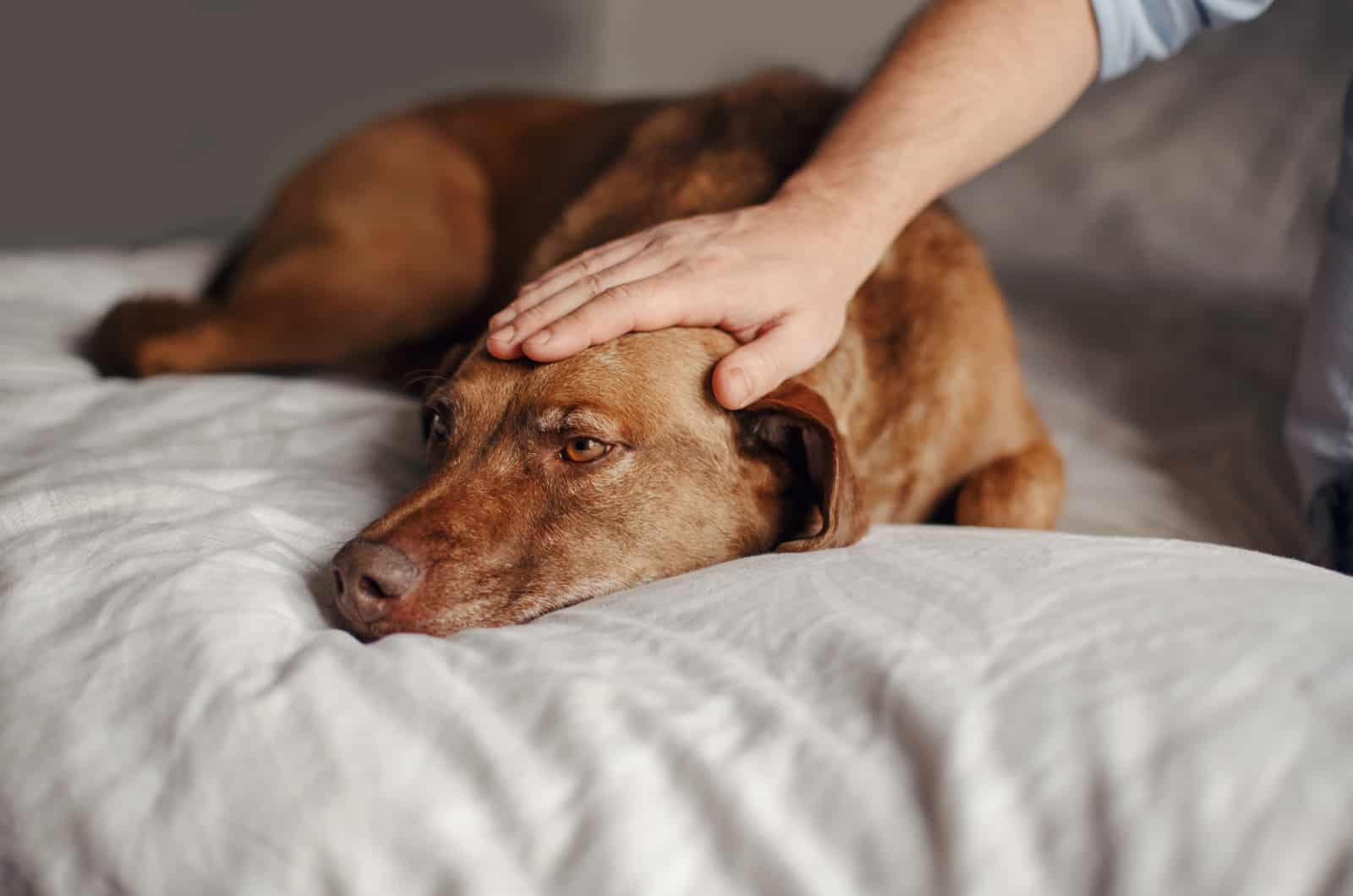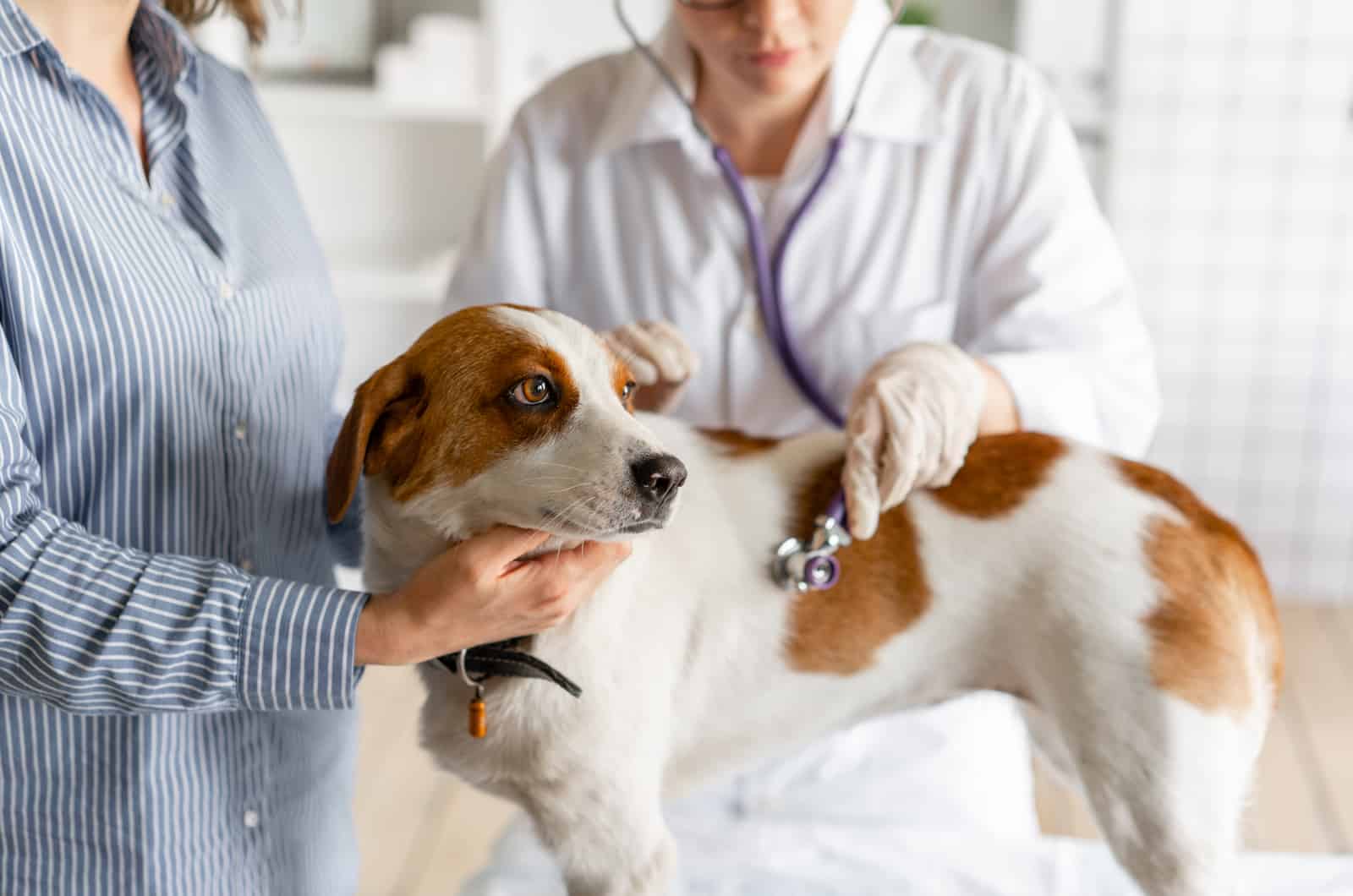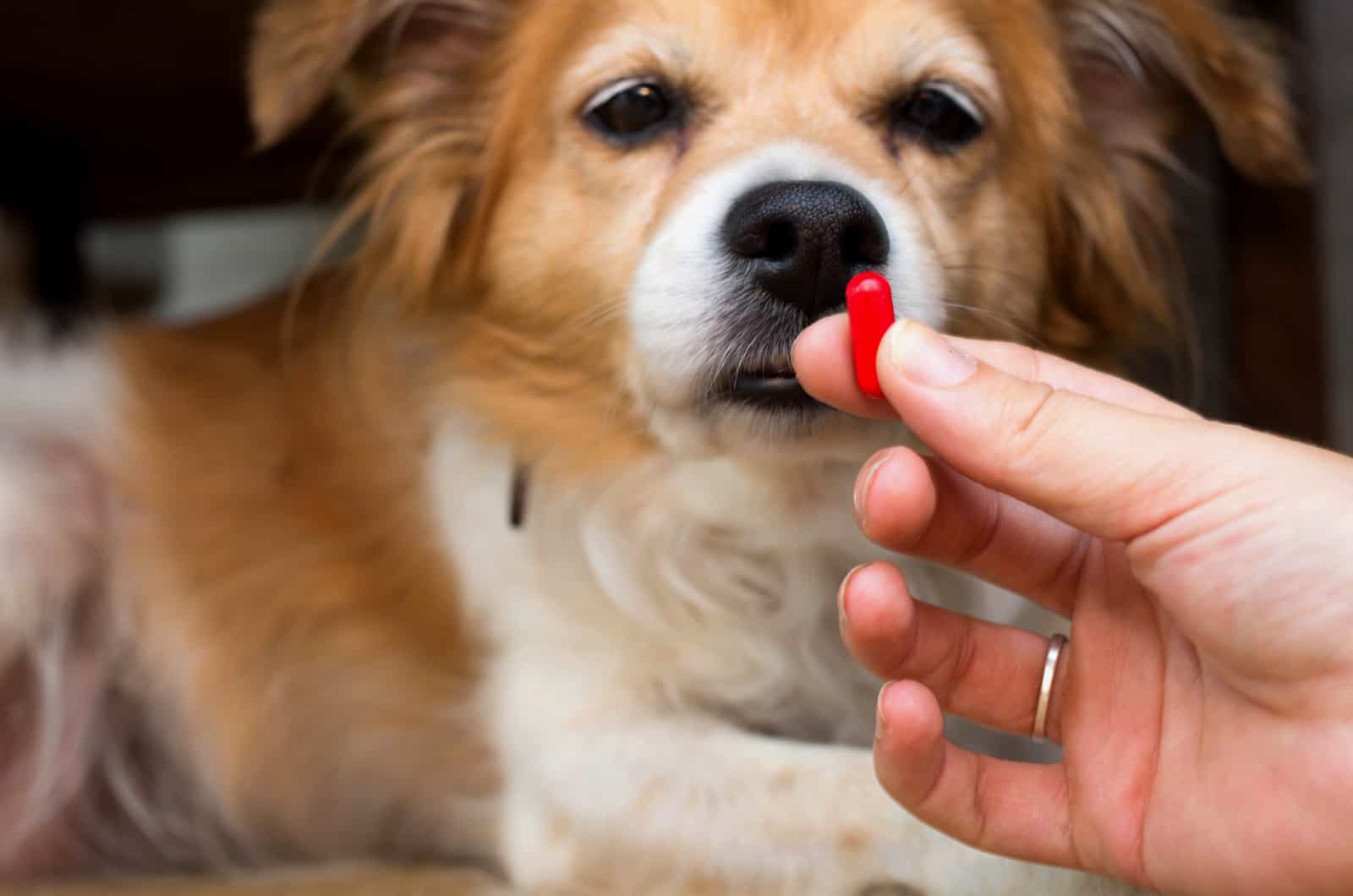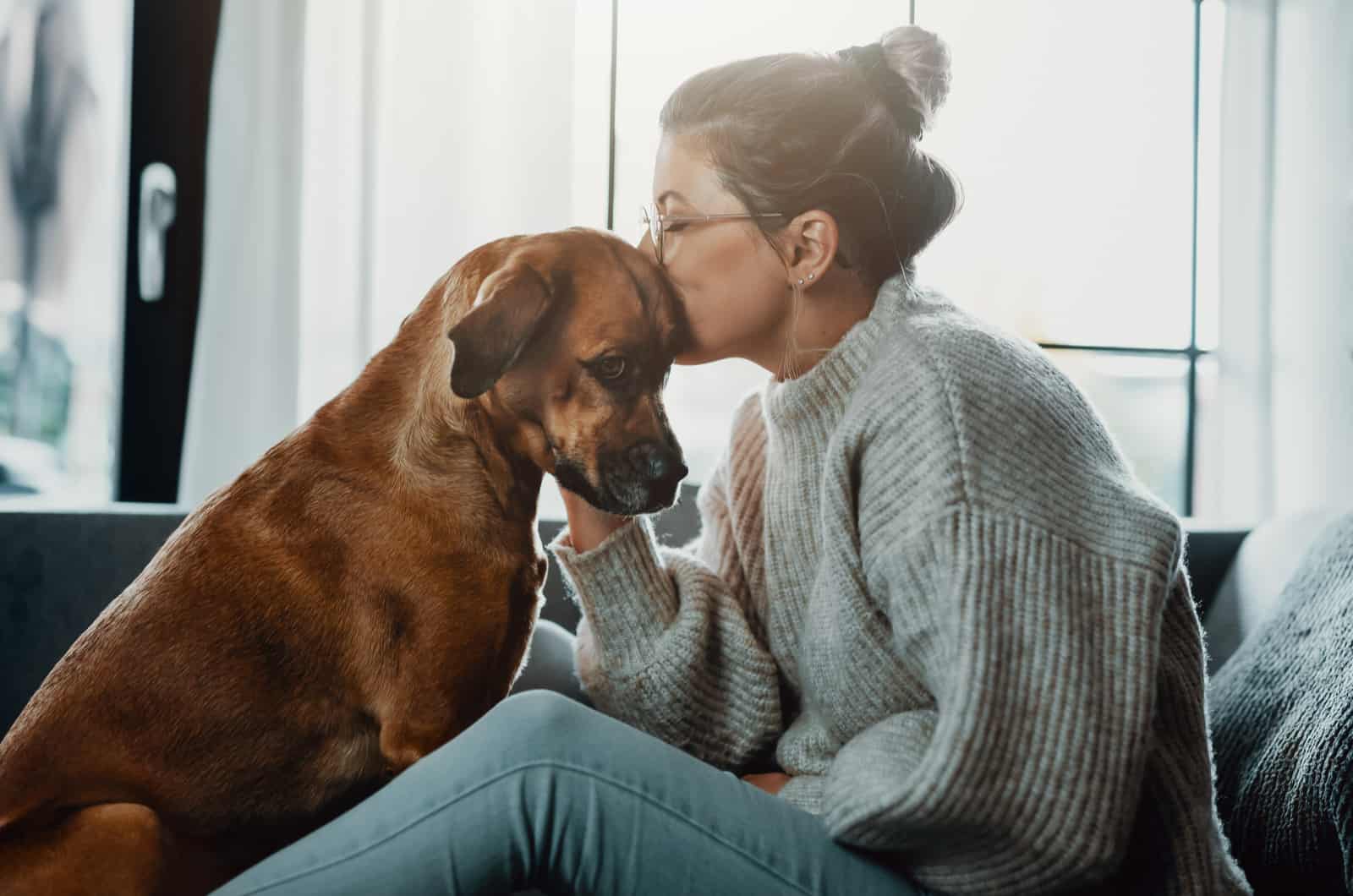Neutering is an important thing all experts advise dog owners to do. However, many people worry about the pain this might cause their four-legged friends.
If you’re a dog parent who is preparing to get their dog fixed, you are probably wondering, “How long will my dog be in pain after neutering?” No one wants to see their pooch suffer. However, some procedures are for the greater good.
Neutering surgery is a procedure during which a veterinarian will remove your male dog’s testicles. There are many benefits to neutering your pup. Not only will there be fewer unwanted puppies abandoned on the street, but you’ll also be prolonging your dog’s life.
Fixing your dog greatly reduces the chances of testicular cancer, as well as many other health conditions. Not to mention that it can prevent some unwanted behaviors, such as humping or masturbating. Animal aggression will likely also be reduced. So, behavioral problems and health benefits are clear signs that your dog needs to be neutered.
Similarly, you can also spay your female dog. Spaying is a surgical procedure where the vet will remove the dog’s ovaries, fallopian tubes, and uterus. Spaying will also reduce the risk of several types of cancers.
As a pet owner, I too have wondered, “How long will my dog be in pain after neutering?” After some extensive research, here’s what I’ve found:
Will My Dog Be In Pain After Neutering?

When neutering a male dog, the pain should usually last no more than a week. This is a fairly simple procedure that isn’t as huge a shock to his body as some other more invasive operation would be.
Right after the surgery, your dog might even be overly excited or anxious as a result of being under general anesthesia. It isn’t until the effects of painkillers fade that the pain starts, and it will likely remain for up to 72 hours.
However, spaying is a whole different story. It involves many stitches, and the wound is much larger, so the pain can last much longer.
It is a good idea to keep your dog calm and not to allow them to be overly active until recovery is complete.
Is Neutering Safe?
Other than wondering, “How long will my dog be in pain after neutering?” you may wonder whether neutering is safe.
Both neutering and spaying are standard procedures that are done incredibly frequently. The chances of complications are very slim. So the risk of the operation is minimal.
However, as your dog will be put under general anesthesia for this operation, there is always a small risk of possible complications. The same applies to humans undergoing an invasive medical procedure.
Because of this, your veterinarian and surgical team will have to closely monitor your doggie and stay on the lookout for any signs of complications.
The Difference Between Neutering And Spaying
Both spaying and neutering are surgical procedures that prevent dogs from reproducing. Spaying and neutering can sometimes be referred to simply as fixing. When pet parents want to have their dogs fixed, they are talking about spaying/neutering.
However, they are two different procedures. Neutering is generally a much easier procedure, as it’s less invasive. On the other hand, spaying requires cutting of the skin and muscles, making it much more invasive.
This is why the recovery process will also vary greatly depending on the type of operation. Overall, spaying is an operation with a much greater risk of complications – but it is still a routine surgery, and the chances of something going wrong are very low.
How To Tell If Your Dog Is In Pain

We’ve already mentioned that most of the time, a dog won’t be in pain after surgery as he’ll still be under anesthesia. About 12 hours later – sometimes even the next day – once the painkillers wear off, the pain will start.
You’ll know this as your dog will likely start groaning. If the pain is high, he might even have tears in his eyes. Most dogs will reject food if the pain is severe. Also, they won’t move around if the pain is too high. Instead, they’ll go to some quiet place and lie there for most of the day.
You can expect your dog to lick the surgery site, which can cause infections. This is why your vet’s advice might be to wear an Elizabethan collar or a post-operative jumpsuit. This can prevent your dog from hindering the healing process.
How Long Does The Pain Last?
It is an emotional decision to opt to spay/neuter your dog. One of the most common questions vets get is: How long will my dog be in pain after neutering?
Usually, the severe pain will last for up to 24 hours after your pup leaves the animal hospital. Some vets might recommend pain meds for your dog, especially if the surgery was somewhat challenging.
However, keep in mind that you should never give your dog human pain medication. There are special dog pain medications that are safe for use in canines. The side effects of human medicine can be quite severe. Always ask your vet for some take-home medications if you fear your dog will be in pain for too long.
It is smart to make sure your pet stays calm for up to 48 hours after the dog’s surgery. Otherwise, you’re risking him hurting the incision site.
Keep in mind that spaying can make a dog hurt for longer. Usually, the post-operative pain will be severe 36 hours post-surgery. The recovery period for spaying is somewhat longer than for neutering.
However, the pain for both procedures should disappear about 72 hours after surgery. This will entirely depend on your dog’s health, strength, and overall mental stability. Any activity can make the pain last for a couple of days more. Sometimes, the pain might last for more than 10 days!
How Long Until The Dog Recovers

Not only do most dog owners wonder: “How long will my dog be in pain after neutering?” They’ll often wonder how long it will take until their pooch is fully recovered.
Most of the time, the dog will feel perfectly fine 4–9 days after surgery. As long as the first two days go well, your dog should feel alright. Sure, he’ll feel uncomfortable, but there won’t be any pain.
About 3 days after surgery, you might take your dog to the vet for a wellness check. If they are satisfied with the post-operative progress, they’ll likely recommend continuing with your normal routine and regular pet care.
However, we would still advise making sure your dog is fairly calm until the dog’s incision fully heals. This is the best way to prevent drawbacks and additional health problems.
How To Manage Pain After Neutering
As a dog owner, you probably want to do all you can to help your pooch deal with the pain. However, the best thing you can do is just let him rest and sleep for as long as he’d like.
Many dogs will want to play and run around as soon as the pain stops. However, this isn’t something you should allow, especially as you likely want a fast recovery. Instead, here are some steps that can help him out:
• Bring him home safely, in such a way that the stitches remain protected. Using a cone is a good way to prevent him from licking the incision site. Some e-collars can also help you monitor his behavior.
• Let him rest and sleep. Don’t poke him or try to make him active just for the sake of it. Just like humans, dogs need time to sleep and get rest after invasive surgery. Let him be.
• Take good care of your dog’s hygiene. Make sure that his sleeping area is in a quiet spot that is germ-free and fairly warm. This can help prevent infection.
• Don’t make too much noise, as this can prevent your pup from sleeping.
• Don’t shower or bathe your dog at least 10 days after the surgery. Doing so might cause the wound to become infected.
• Always monitor the incision site and the suture for any signs of infection. If you notice pus or blood, contact your vet immediately.
• Finally, the best thing you can do is keep your pup away from other pets – if there are any in your household. Other dogs might be excited to see their best friend after a couple of hours, and the dog that’s been operated on will be excited to see them. It is best to keep them separate for a while.
Do Dogs Need Pain Medication?

We’ve already briefly touched on this, but let’s explore it a bit deeper. When my pooch was operated on, I didn’t just wonder, “How long will my dog be in pain after neutering?” I also wanted to give him some pain meds to help him get relief.
Vets use painkillers and anesthesia to ensure dogs are unconscious before the surgery starts. Then, once the pup wakes up, they’ll be given pain medication. Most of the time, they’ll last up to 24 hours.
If the operation was complicated, your vet might give you some long-term pain medication for your dog. They’ll measure the size and weight of your pooch and prescribe the right amount of drugs for him.
Don’t ever try to give your dog painkillers on your own. Many pet parents have tried giving their dogs human medication, but this can have adverse side effects, such as vomiting, diarrhea, or even infection – sometimes even worse.
When To Call A Vet
We’ve already mentioned that the vet will usually ask you to bring your dog back to the clinic for a check-up 3 days after the surgery. However, this doesn’t mean that you can call it a day and just count on the fact that your pup will be okay.
You should always monitor the incision site. If any signs of infections do appear, contact your vet immediately. Don’t try to take care of it on your own. Chances are, you’ll do more harm than good.
You should also go to your vet if you notice the severe pain lasts for more than a couple of days. You’ll know this if your pup keeps on refusing food or makes noises in pain. This is usually a sign that something is wrong.
Also, if your dog makes the wound worse by licking it, this is another instance when you should consider contacting the vet. If you don’t manage to find a way to prevent him from touching the incision site, infections are bound to happen.
Read More: Dog Urine Color Chart
Benefits Of Spaying/Neutering

While spaying or neutering is an emotional decision, there are many health benefits to both of them. Not to mention the benefits this can bring you, as fixing your dog can help with undesirable behaviors.
If you spay/neuter your dog, expect this procedure to stop mounting, animal aggression, and roaming. This can lessen the chances of your dog getting lost in the neighborhood.
At the same time, your dog will have a lower risk of developing some serious illnesses – most of which we’ve already mentioned.
Of course, spaying and neutering can stop unwanted puppies and litters. An estimated 3.3 million dogs end up abandoned every year. If you spay or neuter your dog, you can help reduce this number.
No matter how responsible a dog owner you are, accidents can always happen. All it takes is a minute, and your dog might run away – or create a litter of puppies.
How Long Will My Dog Be In Pain After Neutering? Final Words
As dog owners, we cannot help but wonder How long will my dog be in pain after neutering? We think of our pets as our family members, and neutering sounds like a horrible thing to do.
However, the benefits of neutering outweigh the pain your dog will feel for a little while. All good veterinarians will do all they can to make sure your pup doesn’t feel any pain for longer than necessary.
The pain will disappear in just a few days, but the health benefits will stay for your dog’s lifetime. Not to mention how this will do good for your community, as we are certain there are enough abandoned dogs at your local shelter.
As such, we would always advise you to make the responsible decision to help your pooch have a longer, healthy life.
